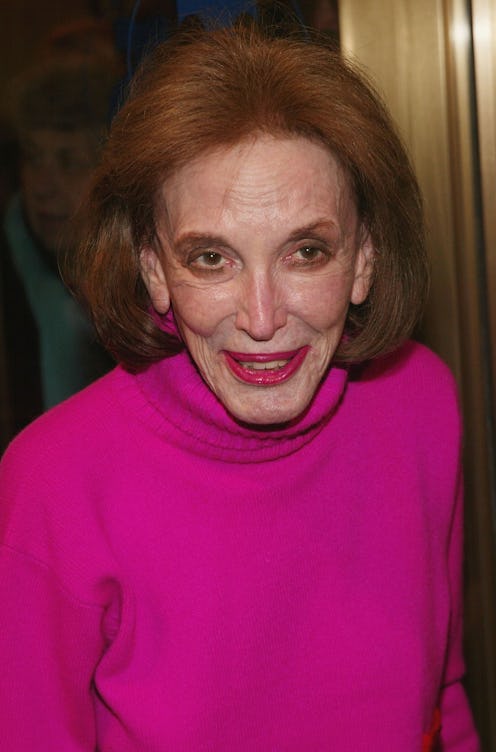News
7 Unsung Feminist Heroes In American History
Remember when "National Women's Equality Day" came out of nowhere last week? Well, here a thought: Maybe we ought to celebrate women’s equality and the women who fight for it, like, at all times. Because for one, that fight isn’t over and there have been plenty of underrated women in American history.
Just last month, the U.S. Army’s elite ranger school opened its doors to women, after Capt. Kristen Griest and First Lt. Shaye Haver graduated from the school in a special co-ed program. Another great moment for gender equality, but we have a long way to go.
In the meantime though, who doesn’t like being reminded of all the bad bitches in the world fighting the good fight of the feminist cause? As Hillary Clinton reminds in the anniversary of her speech at the UN Women’s Conference in Beijing 20 years ago, women’s rights are human rights. But as history has been mostly written by men, not all of its great heroes received time under the spotlight. So let’s take a look at history and some of its lesser-known-but-just-as-awesome women who paved the way for girls like me to do exactly what I’m doing now.
1. Rachel Carson
Before aerosol-free hairspray, Al Gore’s Inconvenient Truth, and Obama’s photo-happy trip to Alaska, there was Rachel Carson and some gypsy moths. In short, to combat these destructive insects, the U.S. government sprayed harmful pesticides onto an expanse of land, some of which was private property. Recruited by concerned property owners who noticed birds were dying, Carson researched the horrific effects of synthetic pesticides for four years. The findings, published as Silent Spring, brought issues of environmental conservation to the forefront of American consciousness — eventually catalyzing to creation of the Environmental Protection Agency.
Jeannette Rankin
As the first woman to serve in Congress, Montana Rep. Jeanette Rankin was the only dissenting voice in the decision to declare war on Japan after the attacks on Pearl Harbor. A feminist and lifelong pacifist (obviously), she was a lobbyist for the National American Woman Suffrage Association and staunchly argued for more female representation in politics, saying government corruption and dysfunction could be attributed to its lack of diversity. Considering women currently compromise only 18.5 percent of Congress, Ms. Rankin might be right on the money.
Marian Anderson
When Daughters of the American Revolution denied Marian Anderson the chance to perform in front of an integrated audience in 1939, the classical singer said "OK whatever” and showcased her velvety pipes on the steps of the Lincoln Memorial instead. More than 75,000 people of all races came, and Anderson became a major figure among black artists finding their voice in a time of deep racial prejudice. Her row with the DAR led First Lady Eleanor Roosevelt to resign from the organization. In her lifetime, she was awarded the Presidential Medal of Honor, the National Medal of Arts, and a Grammy Lifetime Achievement Award.
Margaret Mead
OK, so you’ve heard of Judith Butler, but what about Margaret Mead, the great anthropologist of sex in South Pacific Asian cultures? Her study of different regions in several Papua New Guinea revealed that different cultures had different — and in some cases, diametrically opposing — gender roles. It’s no wonder that she was hailed as a hero in the sexual revolution of the '60s.
Grace Lee Boggs
At age 100, feminist and philosopher Grace Lee Boggs is still going strong after more than half a century as a civil rights and labor rights activist. She was so active in Detroit’s Black Power movement that the FBI thought she was at least partially black. Truth is she’s 100 percent Chinese American. She wrote her fifth book in 2011, The Next American Revolution: Sustainable Activism for the Twenty-First Century, and a few years ago helped start a charter school in Detroit in her and her husband’s name.
Daisy Bates
The Little Rock integration crisis in 1957 was a pivotal moment in American history. Alongside the first nine black students, Daisy Bates played the most important role in that formative episode in the Civil Rights movement. As president of the Arkansas N.A.A.C.P., she guided and mentored the students. Her house was the drop-off and pick-up location for them, therefore a hotspot for KKK vandalism. Later in life, she was part of President Lyndon B. Johnson’s administration.
Helen Gurley Brown
“Guess what? Unmarried women have sex.” This was Helen Gurley Brown’s message for America with her book, Sex and the Single Girl, in 1962. Naturally, she went on to be Cosmopolitan’s first female editor and, naturally, the most important one. While she has been criticized for her role in creating body-shaming standards among women, Brown helped pave the way for the sexual revolution among women. She was also probably responsible for introducing the trope of “having it all” to the feminist canon.
Images: Wikimedia Commons (4)
